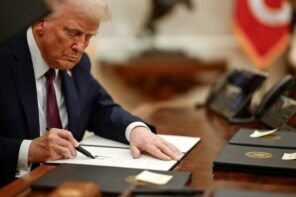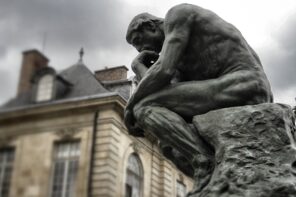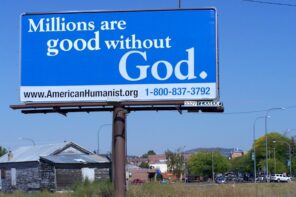More times than I can remember, I’ve had to ascend the minbar and address a Friday congregation reeling. Many Imams will do the same painful work this week. But for many American Muslims, Buffalo and Uvalde strike in other ways. Beyond the infuriating inability of America to act is the rigid commitment of far too many Americans to their purported rights—even at the cost of thousands of lives. Of course, faiths are not countries, but both rise and fall based on how we think they work.
In recent years, many Muslim communities were devastated by fringe groups that hijacked public discourse—they didn’t understand what Islam actually was, or how it historically worked and, as such, they inflicted chaos and bloodshed wherever they took root. And this, I fear, is what’s happening in America: Instead of seeing their society as a living, dynamic moral project, which adjusts and adapts to the changing circumstances of the world, too many Americans see our nation as a rigid project whose changelessness is a mark of glory.
And no matter how many have to die—even children—they will not admit otherwise. All of it sounds awfully familiar.
Last week, I was on a live, call-in episode of Radio Times, talking about my Muslim faith and its future. The first person to chime in with a (contrary) opinion was Muslim; he took issue with some (or many) of the things I’d been saying. Basically, he concluded that my plea for an Islam independent of government was wrong: Islam, he believed, clearly laid out a detailed blueprint for how to run a society, including, for example, rules of taxation. Of course, any cursory survey of the Qur’an would reveal how untrue this is.
I hadn’t heard such an absurd opinion in a long time; I had hoped such fanciful, delusional thinking had died out. After all, it had caused enough harm. But there I was, explaining what I would have believed was obvious and undeniable.
Most of Islam’s most sacred scripture is focused on our character, our piety, our Creator and place in creation. But what bothers me even more about such incredibly juvenile, embarrassingly uninformed opinions about Islam is how even more ridiculous they become upon any measure of reflection. It is a core Muslim belief that Islam is meant to be universal; namely, that the message of the Prophet Muhammad, peace be upon him, is meant to be relevant to all people and all places, up to and until the end of our species.
From agricultural villages in 14th century Punjab to, as far as we know, lunar bases and Martian colonies. Given as much, how can a sacred scripture (viz., the Qur’an) with just 114 chapters, about the length of the New Testament, include specific instructions for each and every circumstance every single Muslim and every single Muslim community (ever) finds itself in? And if God wanted to tell us exactly how to behave in any given situation, why would He give us any moral agency and autonomy?
Why else would God ask the reader of the Qur’an, over and over again, to reflect, to use her best judgment, to make her best effort, and to learn from others? If the Prophet Muhammad, peace be upon him, was the last Prophet—and Islam certainly insists on as much—then everything he communicated has to be universal enough to be meaningful but flexible enough to reflect the nuances and characteristics of different experiences. This is one thing a lot of people don’t understand about Islam.
It’s not a simple, black-or-white tradition, with right and wrong always entirely obvious. Maybe that’s compelling when you’ve not lived so much, or experienced much complexity, or faced any real hardship. But with some deep exposure to the world, such ill-advised conviction and certainty rapidly disintegrates. To give a simple example: If you’re wealthy, your moral obligations are different than if you’re poor. If you’re healthy, your moral obligations are different than if you’re unwell.
And as individuals go, so too human communities. If my mosque has a $100,000 surplus in its budget (speaking hypothetically), should we spend that money on improving its campus? Hiring new staff? Supporting victims of abuse? Building out a charitable outreach program? Expanding our educational offerings? Or direct that money to a rainy day fund? Who, seriously, believes the Qur’an has a clear answer to this question? It’s like saying God told us what the speed limit should be. To be clear: Of course He did not.
However, the Islamic tradition is often condensed into five objectives—five ends, or values, that religion seeks to maximize, including life, family, property, intellect, and faith. Of course, sometimes these conflict, at which point we’re compelled to prioritize: A vehicle is property, of course, and the individual right to property is quite significant in Islam, but it isn’t absolute. If your property can harm someone, then the right to life supersedes the right to engage in commerce or build wealth. So consider the question of speed limits again.
As cars become safer and smarter, maybe the speed limit can go up. But as traffic increases, maybe it should go down. (I don’t know, I’m not a traffic engineer.) Then there’s the urgent question of pedestrian safety. Oh, and fuel efficiency, not to mention global warming. So many considerations. If you don’t know where I’m going with this, let me just add in: We in our country rightly have a minimum age for driving. Mandatory safety features. Compulsory insurance. All cars must be registered with a government agency.
And should it be any other way?
Faith shouldn’t spell out a political agenda. It does however cultivate values and virtues that help us discover moral means to moral ends. Too many Muslims, in recent decades, were consumed by religious narratives that left no room for prioritization, no space for reflection, and no possibility for course correction. The result was a rigid, brittle faith, which began by suffocating human agency, and ended by producing mass violence, political chaos, and widespread spiritual disillusionment.
Something similar is happening to America.
Have you seen a set piece battle from the Colonial Era?
An unhealthy society is rigid, dementedly attached to what went before, unable to imagine that the world’s circumstances and possibilities change and, with them, we must change, not because our highest values change—but because the ways available to live out those values change.
When America was formed, in the late 18th century, life was more precarious. More people lived on farms or near the wilderness. Many people had to hunt for food, or otherwise supplement their diets on their own. There were no organized police forces capable of rapid response. Weapons were notoriously slow, ineffective and imprecise; I mean, have you seen a set piece battle recreated from the Colonial Era?
Security, prosperity—even basic nutrition—required that many people had access to weapons.
We do not live in 1776.
That alone would require us to revisit what a right means—not to mention, what the terms in each constitutional amendment mean. But it’s more than that. If tens of thousands of Americans are dying every year, and we literally cannot send our own kids to school without wondering if they will come back home alive and unharmed, because of a right we cannot question as if it’s the word of God, then what the hell is wrong with us?
I confess I do not understand.
Not just as a human being. Or an American. But as a person of faith, too. In my own religious tradition—and every such tradition, really—even sacred scripture must be read in context. A simple example: The Qur’an commands believers to congregate on Fridays for a special weekly prayer service. Yet, with some very glaring and illustrative examples, religious leaders all over the world rather easily suspended this command during the pandemic.
In a contest of values, the right to life prevailed. And here’s the thing: Much of life is going to be a contest of values.
Do we really think the Founding Fathers, who after all hammered out the Constitution as a compromise (it was not revealed by God, it was drafted by men—and even the word of God must be read in context), would look at America today and think: “Yes, the country is violently tearing itself apart, and children are being daily maimed and murdered, but what will happen to democracy if automatic weapons are not immediately available to everyone?”
These are many of the same Founders who, after all, scrapped the Articles of Confederation.
Because they weren’t working the way they wanted them to.
The Articles were the specific means to a greater end: National unity, harmony, prosperity, and security. When that didn’t pan out (and mind you, they waited about a decade for the results to come in), they didn’t scrap the ends.
They rethought the means.
Rights, responsibilities, and values exist in hierarchies. A culture that cannot understand this will not endure. And a community that refuses to understand this will shatter at the first sign of pressure, and soon disappear from the pages of history. Nations and faiths are different in many respects. But they share at least this much in common: If they cannot adapt to new circumstances and new realities, then they will not endure.
At risk are not only the lives of innocent Americans (and those are, on their own, enough cause for mass action)—at this point, who can honestly say, “we never expected this to happen here”?—but the very idea of America itself, of a peaceful, prosperous democracy, that people want to live in, can live in, and can thrive in. Thoughts and prayers, yes. But I believe that God does not change the condition of a people until they change what’s in themselves.
And if they do not? Those of us who are willing to look at other histories, other communities, and other contexts would learn a fearful lesson. We’ve already paid a terribly high price for our heartless rigidity. But as painful as it is to imagine, there may be far worse to come. That is something all faith leaders should remember when they next stand before their congregations, wondering what they need to hear.













